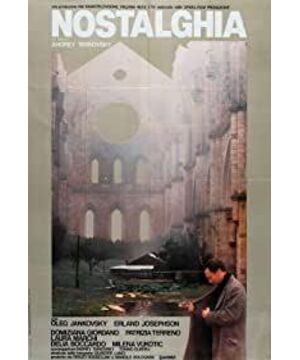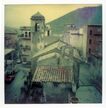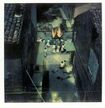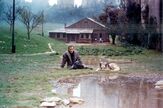Originally, I didn't want to start writing "Nostalgia" so early, but I couldn't help but want to write down some ideas first.
Nostalgia is no doubt puzzling, the recurring imagery, the interweaving of reality and dream, the disappearance of causal logic, I thought it was these factors that were preventing me from getting close to Andrei Tarkovsky, but at the end of the film I suddenly realized Understand that what really prevents me from approaching Nostalgia is not these seemingly modern formal skills, but the difference in the nature of life.
This is an era of pursuing universality. Since Goethe put forward the concept of "world literature", countless successors have been discussing and pursuing its realization. What is the basis of universality, human nature? Is it emotion? When we say "the more national the more the world", what we are looking for is the universality based on the special, and we firmly believe that the universal forces such as love and family can break through the barriers of cultural norms , accepted by readers in a completely different culture. We are so used to reading this way that we never seem to have thought of a completely different way of expressing it. This way is Andrei Tarkovsky.
Andrei made the film from the most personal experience. The strong nostalgia of the Russian poet Andrei in "Nostalgia" is not only symbolic things like houses and family, but some kind of memory soaked in texture, the feeling of feet stepping on the mud through a lace turban, feathers The feeling of the fabric of the trench coat as he fell into the water and picked it up, like his opinion on the translation of poetry, is untranslatable.
The loss comes from this. I have always believed that through reading, I can approach the most essential existence of a writer, and through movies, I can also understand a director's pursuit and aesthetic concept. But "Nostalgia" gave me a kind of "pain" for the first time, because although we can learn about Andrei's life experience and film aesthetics through his biography and essays, his childhood memories once shaped him The living environment and life experience that I have experienced cannot be experienced again for me. Without this common ground, it would be impossible to understand Andre in a way, as someone who has lived in Berlin and someone who has never been to Berlin feels the intensity of his feelings while reading Dubliners. will not communicate.
Fortunately, Andre did not deny the audience entry, but he did not use ordinary means to gain the audience's attention, but through "music". "Nostalgia" is a piece of music, and of course Tarkovsky used the means of film to achieve this effect.
In the process of watching "Nostalgia", I have been trying to understand it, but whenever I look for a postmodernist expressive technique in a certain picture, I find myself refusing to explain it with this theory. Because the theory is too weak compared to what the film presents, Andre is amazed at the simplicity and complexity of the film's picture. Before that, there were countless writers who wanted to refuse others to post his works. Or old or trendy labels, but eventually fall into a certain framework. This kind of "framework" shouldn't be used in Nostalgia because it's so powerless and superficial.
What Andre provides to the audience is a new way of watching, a way of watching that is unique to the film - to feel, to think, not to think about the film itself, but to think about existence. It seems not new to say this, because it is a new poetry direction that Zhang Zao and Bei Dao explored after the 1990s, but for readers, it is important. From elementary school, middle school, and high school, we are limited by a way of "understanding" reading. Whether it is Zhu Xi's philosophical poems or Shu Ting's "To the Oak Tree", they all point to a final meaning. In this way, we must come to a truth through reading, either about life or about philosophy. But the essence of poetry is to present "real" reality, which is doomed to its complexity, and "meaning" only limits it to superficial and superficial understanding. As the famous Buddhist verse said, "One flower is one world", the complexity of the world can be seen through flowers, but if the problem is that the flowers in our eyes have long lost their multiple meanings and degenerate into flat symbols Woolen cloth.
In this sense, "Nostalgia" provides a reflection on "understanding". To break through the limitations of "understanding", it can be said that watching Tarkovsky is a must. Although there are many barriers, entering his world is absolutely necessary. One of the best things in life.
View more about Nostalghia reviews











